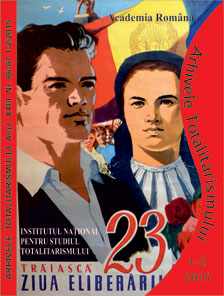Noua perspectivă sovietică asupra crizei ungare din 1956 în condiţiile revizuirii „doctrinei Brejnev” la sfârşitul anilor '80 –începutul anilor '90
The New Soviet Approach of the 1956 Hungarian Crisis in the context of the reevaluation of the „Brezhnev Doctrine” at the end of the 80’s and the beginning of the 1990’s
Author(s): Aleksandr S. StykalinSubject(s): Politics / Political Sciences, History, Diplomatic history, History of ideas, Military history, Political history, Recent History (1900 till today), Special Historiographies:
Published by: Institutul National pentru Studiul Totalitarismului
Keywords: Hungary; Hungarian events of 1956; Gorbachev; Eastern-Central Europe of 1989;
Summary/Abstract: The author focuses on the evolution of the Soviet official view on the 1956 Hungarian events during Gorbachev’s “perestroika” and in connection with the breakdown of Communism in Central-Eastern Europe.The military intervention of five Warsaw Treaty-states against the „Prague Spring” in august 1968 was theoretically fundamented through the so-called „Brezhnev Doctrine”.That was gradually abandoned by the Soviet leadership during the 1980’s and mostly during Gorbachev’s perestroika. Simultaneously a reevaluation of the Soviet official position towards the 1956 Hungarian Revolution occurred. The process reached its climax at the end of the 1980’s in the context of the breakdown of the Socialist bloc.
Journal: Arhivele Totalitarismului
- Issue Year: XXIII/2015
- Issue No: 1-2
- Page Range: 194-213
- Page Count: 20
- Language: Romanian
- Content File-PDF

